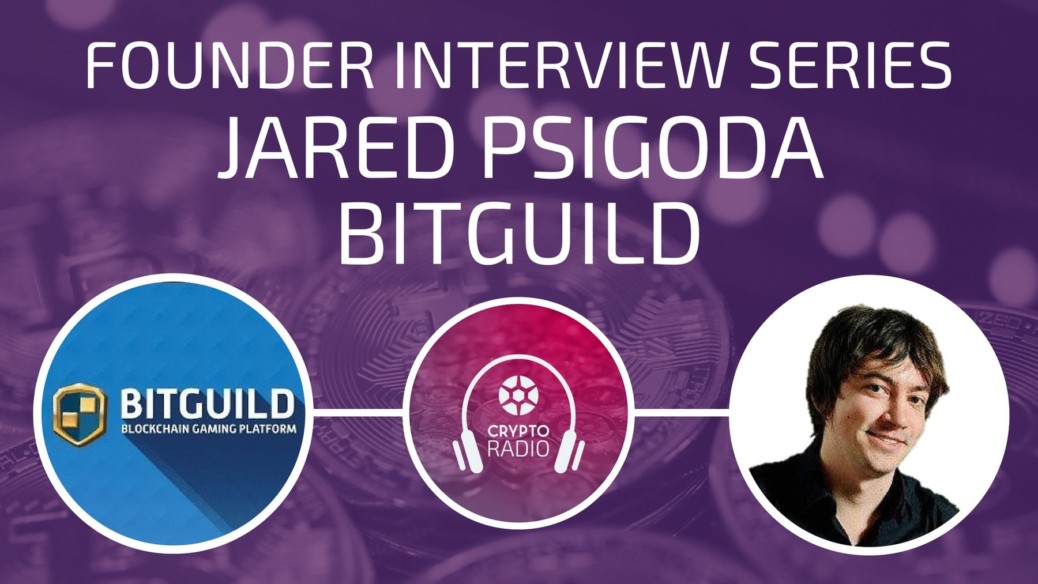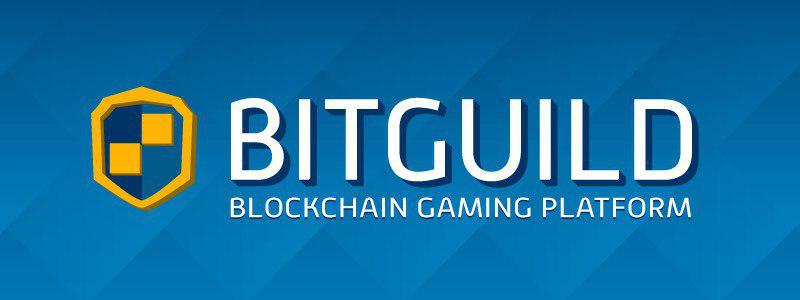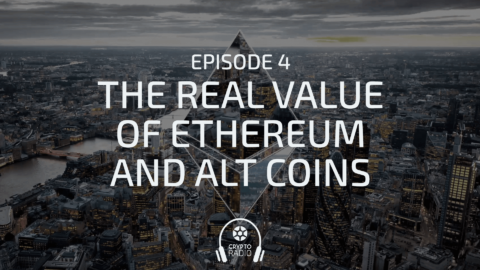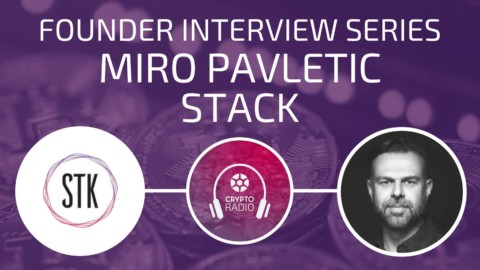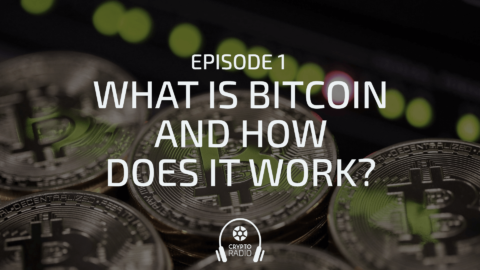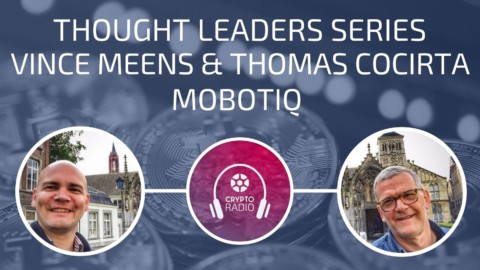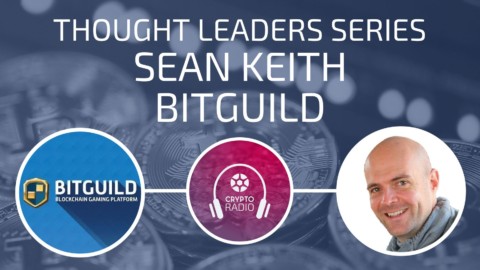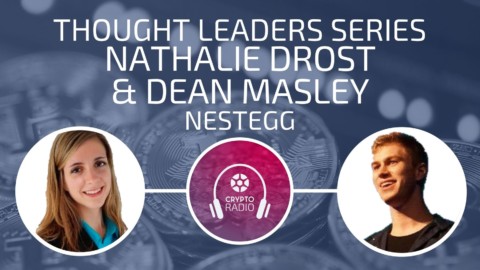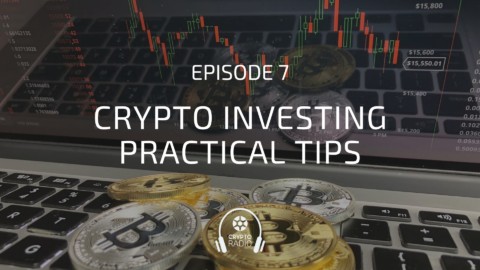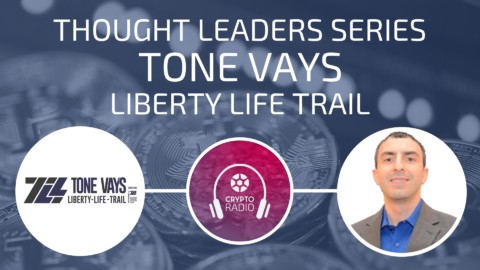Podcast: Play in new window | Download
Euvie: Hi crypto world, it’s Euvie Ivanova. Today on the founder interview series we have Jared Psigoda, the founder and CEO of Bitguild. Bitguild is a blockchain based gaming platform that enables gamers to own, [00:01:00] trade and sell their in-game assets. Bitguild just completed their token sale on April 5th 2018, in which they raised $35,000 Eth or just over 13 million USD at the current market rate. We recorded two interviews with Jared, so if you enjoy this one stay tuned for the second one on the thought leader series. To get the show notes from this episode go to cryptoradio.io/bitguild1. Alright, let’s [00:01:30] jump straight in.
Mike: Jared, welcome to the show. Hit is with your elevator pitch.
Jared: Sure. We recently formed a project called Bitguild. Bitguild is a decentralized platform for playing blockchain based games. In our opinion, we’ve seen the game industry evolve over time from boxed sales to the subscription model to free to play gaming. We actually believe that blockchain gaming, which is gaming that utilizes smart contracts, [00:02:00] it tokenizes items so that players actually own them. It’s going to be the next big thing or the evolution of the gaming industry. Bitguild basically aims to be the place where you go to play those types of games.
Mike: Is the whole game actually happening on the blockchain or just the assets that you’re trading?
Jared: It’s going to be different for different games. The main thing is that the assets are traded over the blockchain. In a typical game, for example, you’d kill a monster and that monster would drop a piece of armour, a weapon, or a sword. [00:02:30] On the game servers it would say that ‘Jared has this sword’. In a blockchain game, when you kill a monster and that monster drops a piece of equipment, what is actually going to be happening is that piece of equipment is going to be sent to the player’s digital wallet. He will 100 percent own the piece of equipment from the game.
Mike: What kind of advantages does that give over the current way we handle assets in gaming?
Jared: I think one of the biggest advantages is that you can buy, sell, trade, or do whatever you want with your items. [00:03:00] I spent years playing games like World of Warcraft, for example, and in World of Warcraft what would happen is every once in a while – because I travelled all over the world a lot – is that my IP would get flagged as being in a different country than I’m usually in. For example, if I’m from the United States, if I’m on a business trip to China and I log into my account then, all of a sudden, my account is banned. When a game developer bans your account, you lose everything essentially. It doesn’t matter how much time, energy, money I put into that game. [00:03:30] If they say it’s gone, it’s gone.
Companies like Blizzard do not let you buy or sell items that you acquire in the game for real money, or at least they didn’t used to. They tried later on with Diablo three and we all know how that went. In general, if a player owns the item he’s free to do with that item whatever he wants. He can sell it if he doesn’t want to play the game, he can trade it for an item that’s more suitable for his character. There’s just a whole bunch of possibilities.
Mike: How is this not currently able to be done [00:04:00] in the traditional model? Potentially, is it incentives not being aligned for the company and the user?
Jared: I think it’s a couple of things. Let’s talk about it from a game developer, a game publisher’s perspective. Whenever you’re dealing with Fiat currency for selling virtual items, you have a massive potential for fraud. We operated a game publisher for seven or eight years and the issue that you have is that, essentially, there’s no protection for selling virtual items [00:04:30] on the internet. If I were to sell a virtual sword in my game and you were to go and buy it, and two day, two weeks, or even two months later, you could call Visa or Mastercard or PayPal and be like, “Hey, I did not authorize the transaction for that virtual sword.”
Or, “Hey, my kid got a hold of my credit card and he went and bought a virtual sword. I don’t want it.” What essentially Mastercard or Visa or PayPal is going to do is they’re going to refund you money. They’re going to refund your money and they’re going to subtract that money from our band account. [00:05:00] Then they’re actually going to give the game developer a $15 to $25 fine, as well. There’s absolutely nothing the game developer can do on that front. They can’t call Visa and be like, “Hey, here’s a screenshot of us delivering the Sword of Hope to lil’ Bow Wow in [inaudible [0:05:18] at the bank. Visa’s not really going to listen to that.
Game companies have a huge amount of risk if they ever said that an item actually belongs to a player, then they have liabilities and it’s [00:05:30] just a whole world of hurt. Obviously, with the blockchain, if you have a transaction where you spend Ethereum or our currency, which is called Plats, and you buy an item through a smart contract, then that transaction is immutable, there’s no chance for fraud on the developers end, there’s no chance for fraud on the player’s end. I think that’s reason number one. Reason number two is, especially getting into free to play gaming, it’s just not financially a good idea for a game developer to allow players to sell [00:06:00] their items.
If I’m opening loot boxes or card packs and I get this really great item for an archer but I’m a warrior, then what the game developer hopes is that you just keep opening more loot boxes because that’s how they generate their profit. Whereas, in a game with an open and free trade system, I could be like, “I got this really nice piece of equipment for your class, I see you’ve got one for my class. You can’t use that, I can’t use this. Why don’t we just trade it?” It has potential to takeaway from the massive amount of profits that the game developer is getting, [00:06:30] and it puts more of that value back into the player’s hands.
Mike: Is that why you guys are taking this from an independent perspective instead of being the blockchain of this specific game?
Jared: Yeah. We’re not just the blockchain for a game. Essentially, we see ourselves as being a platform, we’re a portal, where if you want to play blockchain games you can go and play a whole plethora of different games available on the platform. Let’s say you’re playing game A, you get sick of game A, you want to go and play something else. You could technically go and sell all of your items from game A and, [00:07:00] on that same portal, you could go and buy a new set of items for game B. Go and find that new game and play that new game and have some items in that new game. We’re trying to be more of a solution for multiple games all being available on the same platform with items that are tradable and sellable between those different games.
Euvie: Are you going to be creating an API or a protocol that games can use and plug into their system?
Jared: Yeah. We’re going to be developing a suite of developer tools, essentially, which will allow a developer who does not have a lot of experience with [00:07:30] blockchain and blockchain technology to be able to more easily create a blockchain game. That’s something that we’re going to be working on.
Mike: Can you help give us an idea of the size of this industry? Because most people who are not gamers are not going to think of size of a market of skins or in-items. Do you have numbers?
Jared: I don’t have the exact number, it’s a hundred and some billion dollar a year industry, if we’re looking at the total game industry. I think what we’re more trying to go out there and, [00:08:00] I don’t want to say revolutionize, but the industry we’re hitting is more probably the free to play industry. There are a lot of great projects out there that are talking about skins and skin trading and working on these more large-scale client games or esports games and tokenizing some of their assets, but we actually see free to play as the biggest space that needs disrupted right now.
Free to play started out as, “Hey, we’re going to drop the barrier of entry for people to play games, because games are free to play, it doesn’t cost any money.” What we quickly realized [00:08:30] is that ‘free’ is the most expensive business model in the games industry. All of these free to play games, they started becoming hugely, hugely profitable with players spending tens or even hundreds of thousands of dollars on these games. We think free to play has gotten a bit stagnant. The developer profits are ridiculously high, it’s becoming very centralized with just a few companies owning the whole market. We’re trying to disrupt that space more than necessarily the Hu- G or Fornite [00:09:00] or League of Legends type of space.
Euvie: Right. Free to play, is that the same as freemium?
Jared: It’s a bit different. A freemium game is typically a game that you download for free in the app store, but then there’s the option to spend $5 or $10 and purchase more of the game’s content. Free to play is the concept that the game is free but you can buy upgrades or armour or potions. The difference between a free to play and a freemium game is free to play, the amount of money you can spend is almost unlimited. Whereas, freemium, it’s usually [00:09:30] a little bit more soft core where you basically just play for free and then you pay $5 or $10 to unlock the rest of the game.
Mike: We’ve gone to a lot of conferences in the last year and we’ve seen a lot of new companies come up in the gaming space announcing their ICO and their new blockchain project. I definitely know already you’ve probably got a lot of competitors. How are you guys different than your competitors and what’s unique about your project?
Jared: I want to start off by saying that I actually personally think that gaming and blockchain is going to be one of the biggest spaces in cryptocurrency over the next year. [00:10:00] There’s a couple reasons for that. Number one, we’re essentially in a bare market right now I think that all of us could say. We’ve watched Ethereum drop from $1,300 down to a stable $1,000 and now to $350, $400. I think one of the reasons behind that is that we’ve got a lot of really fantastic sounding ICOs and projects that are going to revolutionize the world that have been coming out over the past year. But we have no idea [00:10:30] when they’re actually going to be executed on.
I think one of the reasons for the bare market is a lot of people are getting sick of these ICOs that are granting you new technology, they’re AI plus IOT plus blockchain plus data ownership plus this plus that. Which is great but it’s going to be a while before these projects are executable on. Whereas, games, it’s fairly simple. We’ve got proofs of concept, we’ve got Crypto Kitties out there, we have [00:11:00] Crypto Countries or Crypto Celebrities. People are actually making games and launching games and these games are generating revenue in cryptocurrency. We’re going to see a ton of companies coming out in the space this year. Now, as for Bitguild compared to other projects out there, I think there’s a couple of differences. Number one is we’re aimed at building more of a portal.
I don’t want to say the Steam of blockchain games, because I think that’s a little bit too cliché, but we’d like to be the place that players go to find the best new blockchain games [00:11:30] and to be able to play the best new blockchain games, and to have all the infrastructure to form a community, trade between games, and everything like that. This is different than a lot of the projects out there, which are basically just the asset trading layer. There’s great projects like Wax out there who works with Skins, the op-skins site, which is basically for trading game skins on their platform.
The issue we have is, number one, those skins are not actually tokenized assets themselves. You’re basically using your cryptocurrency to trade something that could be traded [00:12:00] without a cryptocurrency. Whereas, in Bitguild, we feel that blockchain games, one of their most important points is that every item you receive in the game should be a token on the blockchain. We want to build the whole infrastructure around that.
Euvie: It’s more like Crypto Kitties.
Jared: Yeah. A crypto kitty is essentially, that kitty is a token. It was actually one of the reasons we go into this project is because I played Crypto Kitties for the first time and I’m like, “This is kind of dumb but kind of cool.” [00:12:30] Then I realized that those kitties were actually tokens stored in my wallet. Once I saw that I’m like, “Wait a minute, this is interesting.” There’s a whole lot of potential when you’ve got non-fungible tokens and items that are actually stored on blockchain.
Mike: I think it’s quite fascinating that you could grind in one game and have benefits across all other games. You can play your game of choice to upgrade another game. I think that’s quite interesting, you can trade your Link’s Master Sword for Sub Zero’s [00:13:00] new sword or something like that.
Jared: Exactly. Or, you could bring Link’s Master Sword into Mortal Kombat and Sub Zero could use it as a weapon. Because these are items on the blockchain, there’s essentially nothing to stopping game B from calling on game A’s item. If I made a game called Pet World, there’s nothing to stop me from seeing if a user has Crypto Kitties in his wallet and drawing those Crypto Kitties into my game. I could even make the Crypto Kitties 3D if I want, I could just change the art asset linked to that token. [00:13:30] There’s going to be a whole lot of potential for game items to travel through different game worlds and to be usable in one game and usable in another game, maybe appear in a different form. It’ll be really interesting to see how that evolves over the next year or two.
Euvie: Right. It’s like game developers can import the whole library, so to speak, of items and maybe pick and choose which ones they want to appear in their game.
Jared: Essentially, yeah, that is completely possible over the blockchain.
Mike: I’d like to get a little deeper into your project. If we can hit that question again, how are you guys [00:14:00] different from other competitors in the space?
Jared: The Bitguild platform is going to be made up a few different central parts. Number one is the actual games themselves. We’re going to be one, if not the only, platform out there right now in the blockchain game space where you can actually go to play multiple blockchain games. The best blockchain games that are out, we’re going to be hosting them on our platform. Number two, is there’s going to be the infrastructure for the inventory or the wallet because these blockchain games, one of their key aspects is that [00:14:30] all items are tokenized. You need a place to be able to see all of those items.
You need a place to see here’s how much Ethereum I have, how much Plat I have, here’s all of my Crypto Kitties, here’s all of my Crypto Doggies, here’s this, here’s that. We’re going to have our own wallet that allows for the display of both typical ETC20 tokens as well as non-fungible item tokens. Part three is going to be the auction house or the marketplace. This is the place where you can buy, sell, or trade all of those different [00:15:00] virtual assets or items that you’ve got in all of your different games. Number four is we’re actually going to have a crowdsourced game development. We’re temporarily calling it the design house, basically it’s going to allow game developers to create what is like an IGO or an initial game offering.
Whereas, a company like us we want an ICO, we write a white paper, we build a team, we talk about our vision for the platform and the cryptocurrency and the token economics – in the future, we see a game [00:15:30] developer saying, “Hey, I want to create a game, here is my game design document,” or initial game offering. “Here’s some of the concept art for what I think the characters should look like or what the game world should look like and I would like to raise, let’s say, one million dollars’ worth of cryptocurrency, one million dollars’ worth of Plat.” They would basically be able to put out that proposal to the community and the community could look at that and say, “Hey, that looks like an interesting game.”
They can go ahead and they can stake their [00:16:00] tokens to support that game. In return for that, what’s going to happen is that game developers are going to be able to give out unlimited edition items for their games. Let’s say they’re going to make, for simplicity’s sake, a car racing game. They could say, “We’re going to have 10 limited edition golden flashy awesome Lamborghinis that are going to be useful in this game. Before our game is even developed, we’re going to go ahead and sell those to the players to raise money for the game. [00:16:30] We’re going to give them away to the people who stake the most Plat in our game.”
Essentially, this is something that happened in a crowdfunding game before, the players are going to have a special item that only they have as early supports. The biggest difference, compared to traditional game founding, is because all of these items are tokenized, they’re going to be able to trade them in the future. If this game becomes essentially very popular and that golden Lamborghini is put on the auction house is going to be worth quite a bit of money. I don’t know if you guys are familiar with a game that’s been really popular recently [00:17:00] called Player Unknown Battlegrounds, but there’s some [inaudible [0:17:03], there’s a bandana, there’s a trench coat. Anybody who bought the game before it came out could get one of those.
They sell for $500 to $1,000 now. It’s crazy but it’s going to revolutionize the way that game developers fund their games, essentially, where they’re going to be able to presale items for the game before the game even comes out and use those funds to create the game. Basically, the community is going to be much more involved in the creation of [00:17:30] the game.
Mike: I love this model, too, because it takes away the cap that is normally there when you crowdfund the game, which you’re just basically paying for the game and maybe a couple of upgrades and throw ins. But this takes the cap off completely while still pleasing the gamer, because that golden Lamborghini might be sellable in the future. It’s like an investment model while they’re also funding their favourite new game.
Jared: Exactly. It’s both you know they’re funding their game in advance, they’re supporting it, they’re becoming a part of it. But if the game’s successful, then that golden Lamborghini’s going to be worth a lot of money. I mean, [00:18:00] there are people in games who absolutely love collecting things and it’s a huge display of pride for a virtual avatar to have this one item. It proves that, “Hey, I supported this game before any of you were even here.” It’s really cool, the kind of things that we’re able to see with that.
Mike: Very cool.
Euvie: How far along are you guys with the project right now?
Jared: We just completed our ICO last night essentially. It’s been a very interesting ride over the past couple of months, assembling the team all over the world, we’ve put together a great team, [00:18:30] dealing with the private sale then the public sale. The platform is way underway for development. The first version of the platform is going to be launching in May, about a month from now.
Mike: Congratulations, that’s awesome. How much were you guys able to raise?
Jared: We raised about $36,000 Ethereum total. There’s about $30,000 of that from the private sale and then $5,000 or $6,000 from the public sale.
Mike: What’s the dollar value of that right now?
Jared: It was 30 million dollars, then 25 million, [00:19:00] then 20 million, then 15 million. Right now, the total dollar value is a little over 15 million dollars.
Mike: That’s amazing. That gives you guys quite a runway to develop this platform, too, that’s really great. How far along is the project right now in terms of development?
Jared: We’ve got a team working on it full-time, who are both building the platform itself, including all of the initial platform functions. That’ll include the account system, that’ll include the inventory, that will include an early version of the auction house. We’ve also got about [00:19:30] four to five game development studios that are building games specifically for the platform. We’re going to have First Party Studios. We’re going to have internal studios building games and we’re also reaching out, we’re investing in, and we’re partnering with different game studios around the world to specifically create blockchain games for the Bitguild platform.
Mike: What does your road map look like for the next six months to a year?
Jared: The road map is essentially the platform and games going at the same time. [00:20:00] There’s a lot of platform functionality that we want to get built up. The early version of the platform, you need to be able to log in, have an account, link a wallet, play some blockchain games. At the same time, we also have plans for a level system for the platform, an achievement system, a whole social forum system, chat system, the design house is underway. All this will be happening over the next six months or so. The real important thing is I think still on the game development front.
Blockchain games right now are so early [00:20:30] that we’re essentially still in the proof of concept phase. We had Crypto Kitties, which was essentially it proves the point that you could own a virtual asset and you could trade that virtual asset, and there’s a bit of randomness in breeding Crypto Kitties to be able to get rare kitties. There were some major, major flaws with that game. We also had Crypto Countries or Crypto Celebrities, the second class of blockchain games, which is basically the concept of having a collectable [00:21:00] asset or card essentially.
You could buy a Crypto Celebrity like Kim Kardashian and then somebody else could buy that Kim Kardashian off you and then you could buy it back. Whoever sold it got the money. They’re very elementary games, whereas we see this the first step in what’s going to be a massive design undertaking of what happens when a game designer is able to tokenize assets, is able to write code in smart contracts that is openly auditable for players. [00:21:30] For example, if you open this magic box, what is the chance of getting a rare item versus the chance of getting an epic item versus a common item.
The potential of what if a game had scarce resources, which is something a lot of people don’t think about, but in pretty much every game on the market you kill a monster, the monster drops a few gold pieces and then one minute later that monster respawns or comes back to life and then he drops more gold pieces. Typical game design is designed around an essentially unlimited [00:22:00] supply of currency into the ecosystem. What happens when a game developer changes that and says, “There is only going to be one million gold produced per day.”
A lot of this is still theoretical but this is some of the things that we want to explore over the next year or so. It’s essentially, we’re going to be trying to put out at least four to six games by the end of 2018 and have all of the functionality on the platform for those items to be on [00:22:30] the blockchain, tradable, and for developers to be able to fund their games through item sales. That’s all slated for this year.
Euvie: Alright. It’s not just rare items, it’s very verifiably rare items that people can actually go and check for themselves?
Jared: It’s verifiably rare items. Going back to our Lamborghini example. If we say there’s only 10 golden Lamborghinis, everybody can see that there’s only 10 golden Lamborghinis and there will never be more golden Lamborghinis inserted into the ecosystem, [00:23:00] which is how the item is going to drive its value.
Mike: Can you tell us a bit about yourself and your team?
Jared: Sure. Myself, I’ve been a gamer for as long as I can absolutely remember. I started playing games when I was about three years old. I started on PC and Nintendo. Basically, I played two types of games very heavily. I played competitive games, StarCraft, Warcraft three, Counterstrike back in the day I played competitively. I also played the MMORPGs [00:23:30] very competitively. That started in ’97, ’98 with [inaudible [0:23:34], Astronaut’s Call, Ever Quest, later on Ever Quest 2, World of Warcraft, and at one point I was a guild leader for the top Ever Quest 2 guild in the entire world. Which meant I played 20 hours a day, I didn’t sleep, and I essentially failed out of college originally because I played too much video games.
I also go into the business side of video games pretty early, which was back in 1999 I sold my [00:24:00] first virtual currency on eBay for about $135. It was called [inaudible [0:24:07] and it was the game token for the game called Astronaut’s Call. Back then, if you told somebody, “Hey, this dude on eBay bought my virtual coins for real money,” everybody looked at you like you were freaking crazy. Like, why would anybody pay real money for something that only exists on the internet? For us, as somebody you grew up in that time, it made sense. I thought that these items [00:24:30] in the game were valuable. I thought that this currency in the game was valuable. It was valuable to me and it was valuable to other players, as well.
When I was 12 or 13 years old, I was able to make $3,000 to $5,000 by selling these virtual items to buy my first high end gaming computer, which was a big deal to me back then. Later on, I actually ended up moving to China when I was about 18 years old. I had started playing World of Warcraft very heavily. We actually ended up creating this fairly large company that [00:25:00] sold World of Warcraft gold and power levelling and items to players from all over the world. After that, we formed a company called R2Games, or Reality Squared Games in 2010, which licensed Chinese browser games and mobile games in the free to play space and published them in Western countries.
Took that public early 2016 in China, and then have been moving into cryptocurrency ever since then. We started Bitguild was a thought at the end of last year [00:25:30] and it went into full motion in January of this year 2018.
Euvie: Cool, what about the rest of the core team?
Jared: We’ve got our CTO whose name is [inaudible [0:25:41], he was on the Messenger platform team at Facebook. He has a ton of experience working in honestly a very large successful company on a product that could handle a billion plus userbase. Before that, he was in games. He was a game engineer [00:26:00] as well as a game designer. He worked at Disney and several other companies before that. He also has been very interested in the cryptocurrency space itself in crypto engineering. He built a decentralized exchange platform that is fairly successful for the exchange of tokens. That’s [inaudible [0:26:17].
We’ve also got Curtis [inaudible [0:26:19], who worked at many free to play game companies. He’s one of the pioneers in free to play gaming. He worked at Kabam, which exited last for a billion dollars. [00:26:30] He worked at [inaudible [0:26:31], which was a creator company, [inaudible [0:26:33], Sega, and all of these other different free to play gaming companies. We’ve got multiple other team members from all over the world. We’ve got people from the US, Europe, Middle East, Asia. We’ve put together a fairly strong team.
Euvie: What about your advisors? Who are some of your advisors and how deeply are they involved?
Jared: Our advisors, we have Justin Sun from Tron fame and legend. We’ve Kevin Cho, [00:27:00] who was the CEO and co-founder of Kabam, which is the company I just mentioned. We have Brock Pierce, who is I guess one of the cryptocurrency God fathers of the west, he’s been doing this for quite a while. They’re all fairly involved, mostly for us bouncing ideas off of them. We’ve got both pioneers in the cryptocurrency space and the gaming space, and they’ve been giving a lot of ideas on just their opinions and idea on how these can be efficiently merged into a crypto or a blockchain gaming type of industry.
Mike: [00:27:30] I want to give you a challenging question here and it’s for the sake of putting up your hand and getting relevant help from the community and from the industry and anyone who would like to be involved. The question is what is your biggest weakness as a team?
Jared: I’d say right now, our biggest weakness is that we know that this is going to be an extremely competitive industry with, I’d say, dozens if not hundreds of companies entering it. It’s just we need to move faster, we need to move as fast as we possibly can. We need to be able to draw [00:28:00] on more resources, we need to be able to bring in more developers. Right now, because crypto gaming is so early, it’s still quite difficult for us to explain to developers who do not have any blockchain knowledge, what exactly is a blockchain game and why does it have the potential to disrupt the types of games that they are already building. That’s something we’re trying to work on right now, is to be able to better explain what is a blockchain game and why is this so important to somebody who does not have a cryptocurrency background.
Mike: [00:28:30] What steps are you currently taking to speed up the process and what steps are you not taking that you would like to be taking?
Jared: The biggest thing is essentially getting our shit in order and essentially having internal though discussion on what are all of the possibilities of blockchain gaming. Talking about scarce resources, tokenizable assets. A lot of it is going to come down on our team basically getting out there and traveling all over the world and giving talks and writing articles not just for people in the cryptocurrency industry but for people in the [00:29:00] gaming industry, as well.
A lot of blockchain companies need to go out there and make sure they’re hitting the crypto conferences and doing their speeches and stuff like that. It’s equally important, if not more important, for us to be getting involved in all of the game developing conferences in these communities and really putting thought pieces and having good talks about how this can disrupt their industry. It’s going to mean a very busy travel schedule probably for me over the next few months.
Euvie: I wanted to ask actually about what kind of partnerships do you guys have in place [00:29:30] as you recognize that you can’t really do it alone? What are some of the companies and individuals that you’ve partnered with aside from those you already mentioned?
Jared: Sure. Again, there are a couple of friends. Number one is the developers, which we mentioned before. I’d say we can’t give out any names but honestly, a lot of them are small studios. At this point and time, the big studios are not really thinking about blockchain nor would they probably understand how to make blockchain games. We’re working with three or four studios in Asia as well as the United States right now, [00:30:00] who are really, really interested in blockchain gaming and who are building projects for a platform. We’re also in talks with blockchain companies. For example, Tron is one of the partnerships we announced.
We’ll be releasing very game-specific items for the Tron userbase. For example, one of our first games is going to be an avatar creator. We’ve built a whole bunch of different Tron branded items that people who are Tron fans, and who are the blockchain fans, will be able to purchase within our games. [00:30:30] We’re also working on potential IP licensing. This is something that I don’t think has really been done in the blockchain space yet, but we would really like to work with a couple of VIPs that we’re talking to and having that actual IP as part of the games that we’re building.
Mike: Interesting. Can you tell us a bit about your marketing strategy?
Jared: Yeah. The marketing strategy, there’s several factors. The most important thing in blockchain marketing, in my opinion, is actually community. Community trumps traditional marketing 100 percent of the time, in my [00:31:00] opinion. We’re spending a lot of time building up our telegram group, our telegram community, building up our Twitter following. We’re asking all of our users and our token holders for their ideas on what they’d like to see. They’re helping a lot in spreading the word. We’ve also got a very traditional user acquisition strategy, where we are promoting the platform, we are promoting the games of the platform to various different channels.
We’re doing the conference circuit essentially, the road shows, the podcast show, the YouTube videos, and we’re also doing a lot of [00:31:30] more, again, thought leadership articles being written on medium about the industry. A lot of it is just about telling the world what we think, finding like-minded people and building a community around that. That’s the best type of marketing you can do in the space.
Mike: Cool. How can people get involved and what are you looking for in terms of help from the community?
Jared: People can get involved by checking out our website, which is bitguild.io. The first thing is to read the white paper, see if it’s something that the community likes and the community believes in. We are also looking [00:32:00] for game developers all over the world. Blockchain gaming, again, is still in its infancy. The games out there on the market are not much more than proofs of concept at this point.
Developers who are interested in a potential blockchain gaming community, members who are interested in playing some cool new games where they own their assets and they can train their assets, basically anybody who believes in the vision. We’re more than happy to listen to everybody’s opinion and figure out how we can build this thing together.
Mike: Jared, it’s been excellent having you on the show. [00:32:30] I think we just covered all of the important stuff. Actually, I guess you’re just pass the ICO phase, there’s no way people can currently invest right now, is that correct?
Jared: That is correct at this point.
Mike: Okay. Good for you. FOMO increases.
Jared: Yeah, we’ll see.
Jared Psigoda introduces BitGuild, a blockchain based gaming platform that enables gamers to own, sell and trade their in-game assets.
BitGuild is a decentralized platform created for a new class of games that live on the blockchain. As Jared Psigoda explains, BitGuild aims to change the gaming industry by giving power back to the gamers and letting them fully own their in-game virtual items, equipment and currencies, instead of having companies own and control all the assets, which is the current status quo.
BitGuild’s team consists of gaming veterans from all over the world. They have a deep understanding of what gamers want and need, and how this massive, increasingly competitive industry functions. Bitguild is building a platform that will serve both gamers and developers and offer blockchain games, auction space, item wallet, as well as their own token, called PLAT, that can be used in various ways on the platform. The goal is to create an infrastructure for the gaming community, where games can be crowdsourced, gamers can trade their items cheaply and safely, and where the assets can be compatible between multiple games. Bitguild is mainly focusing on free-to-play games.
BitGuild has just completed their token sale on April 5th. They sold 4.5 billion PLAT and raised 36.000 ETH. The next step is launching the preliminary gaming portal website in May and launching their first game. By the end of 2018 they plan to release 4-6 games in cooperation with their partners, small game developing studios and blockchain companies.
Resources:
- BitGuild website
- BitGuild White Paper
- Bitguild on Medium
- Crypto Radio’s Founder Interviews

